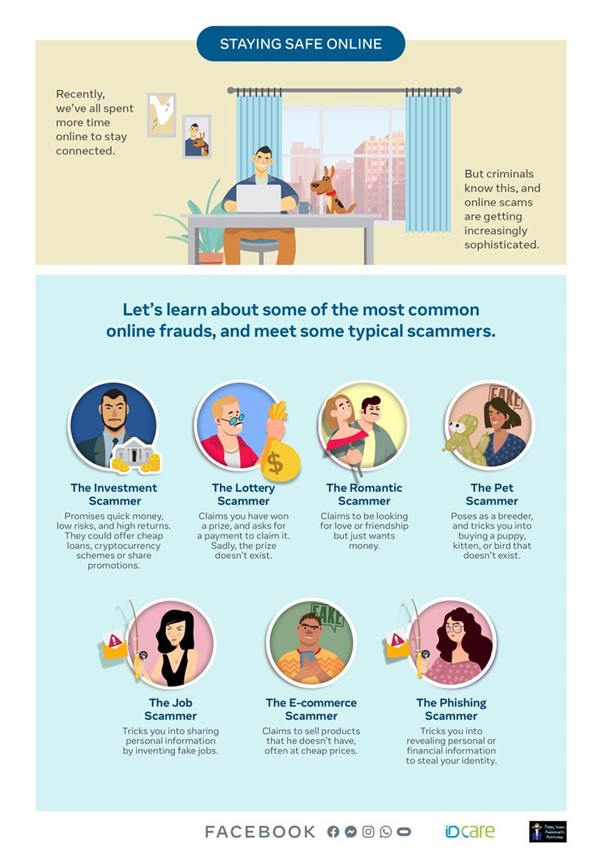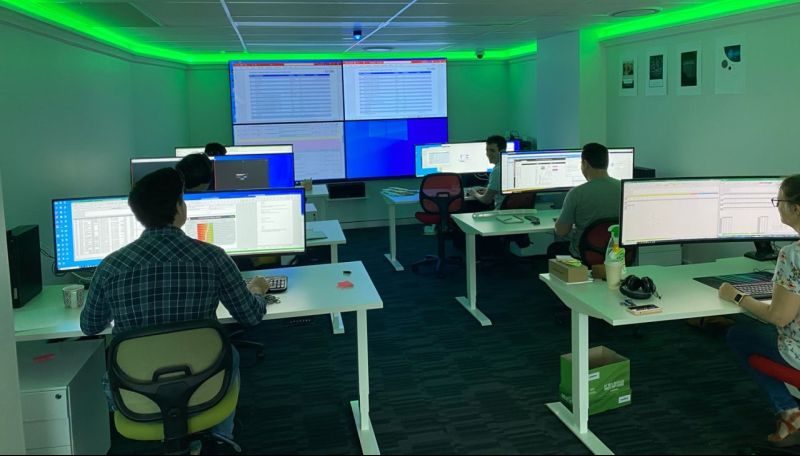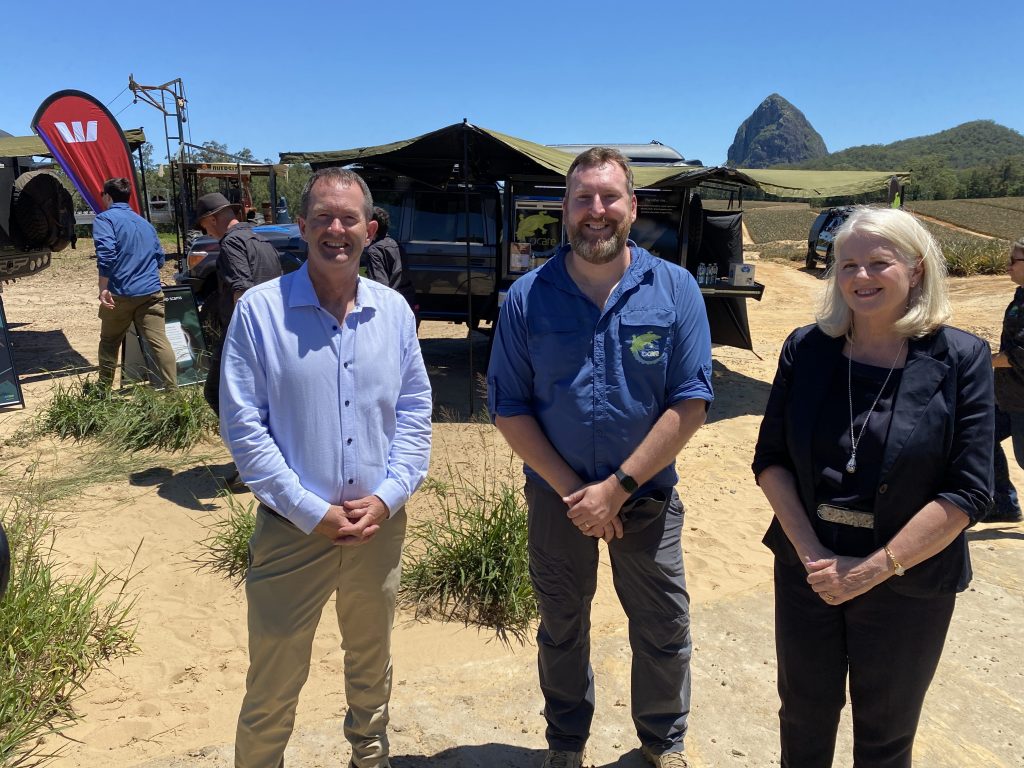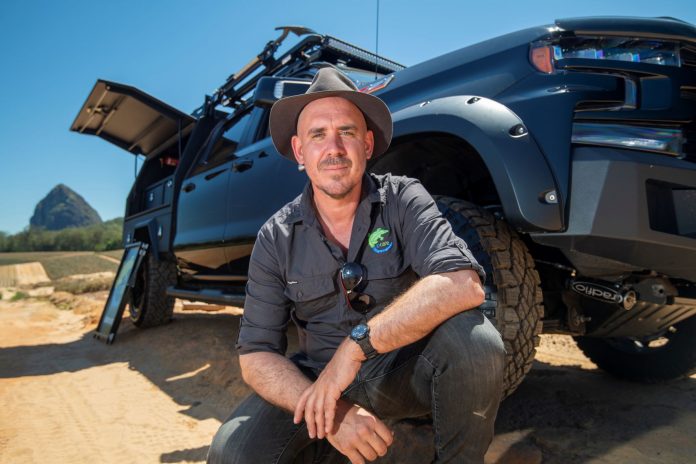A Sunshine Coast breakfast radio presenter has turned cyber-crime crusader, packing up the family for a two-year road-trip mission to combat scams and build online resilience in regional and remote communities.
Rob Blackmore, who spent 15 years with the ABC, now works for Australia and New Zealand’s national identity and cyber support service, IDCARE: the only one of its type in the world.
He is hoping to make a real difference through the CROC (Cyber Resilience Outreach Clinics) initiative, which IDCARE launched on November 15.
Fifty stops have already been mapped out to visit, in locations right across Australia, using a vehicle equipped to handle all terrains.
“(The locations) have been generated through the data and engagements with clients that come into IDCARE – some 500,000 (calls, emails, repeat correspondence) over the last eight years,” Mr Blackmore said.
“They reflect where the need is greatest – in rural communities.
“When you look at our snapshot, the loss is three times greater (than metropolitan areas).
“It’s prevalent and it’s growing. We’re trying something pretty exciting and brand new to see if we can help.”

Mr Blackmore’s association with IDCARE was serendipitous.
“I became involved because I left the ABC and then this opportunity came up, given my relationship with (founder) Dave Lacey, who I had been interviewing on the ABC on this topic of cyber security for a couple of years,” he said.
“And then it just happened that our (family) plans and his plans came together and we’ve created this role.
“It’s a brand-new slate so we’re very excited. And I’m excited to have my family coming along with me for the ride.
“I’m on the road, I’m in a new role, I’m a journalist and I’m an advocate for this cause. I’m learning and I want to learn more from the people I’m going to be meeting along the way.”
 IDCARE has been operating for eight years and its services have increased by 43 per cent in the past year.
IDCARE has been operating for eight years and its services have increased by 43 per cent in the past year.
The charity’s identity and cyber security case managers are on the frontline, responding to cyber attacks, scams and identity crimes – the most recent pertaining to cryptocurrency scams and fake websites, especially for travel visas and online marketplace payment.
More recently, IDCARE went on the road through the Northern Territory and into Queensland, running clinics at a “Scammer Booth”.
Mr Blackmore is the first to admit he is not a cyber-security expert, but he has learnt a great deal from IDCARE’s team that deals with the fallout from the work of mostly overseas scammers.
Help keep independent and fair Sunshine Coast news coming by subscribing to our free daily news feed. All it requires is your name and email. See SUBSCRIBE at the top of this article.
“They could be in giant call centres where they’re going through tens-of-millions of phone numbers or email accounts that they’ve purchased on the dark web,” he said.
“Out of 100 million attempts, they might score a few 1000, which is huge.
“Each of those few 1000 might net $10,000 or $30,000. It’s just a numbers game, really.
“For some reason, they target Australia in great numbers. We’re seen as a bit of a soft target.”
That “soft target” saw Australians report losses of $33 billion to cyber crime in the last financial year, as revealed in the Australian Cyber Security Centre Annual Cyber Threat Report.
Australia is one of the top-five countries in the world targeted by cyber criminals.

With a background as a communicator, Mr Blackmore expects to be able to help regional, rural and remote communities by showing them ways to be more vigilant in spotting possible scams online, in social media and through emails, but also allowing community members to tell their stories and experiences as a warning to others.
“The workshops are going to take a variety of forms: I’ve got the ability to host them around our vehicle – I’ve got the power, the technical and the communication gear to be able to do that; we can do it in shopping centres, libraries; we can go to people’s offices or councils and do one-on-ones,” he said.
“It’s just talking about this sort of stuff and particularly … where people have had an experience as well.
Local journalists supporting local people. Help keep independent and fair Sunshine Coast news coming by subscribing to our free daily news feed. All it requires is your name and email. See SUBSCRIBE at the top of this article.
“That’s going to make the impact far greater because other people hearing that can relate to that.
“‘Or that could be my grandmother, my mother, me, my sister’ etc. Hearing the stories is really going to be a big part of this and then communicating them more broadly.”
Mr Blackmore hopes to meet and encourage others to become “champions of the cause” of being resilient and cyber-smart who will then spread the message throughout their communities on the techniques to prevent scammers “getting through your barriers”.
“There’s lots to do,” the father-of-two-boys said.
“And those champions who can perhaps take up that message and communicate that further, we’re hoping to meet them along the way so they can keep reminding their community of the free service that is offered by IDCARE but also just generally to be more resilient online.”

The idcare.org website outlines simple steps everyone can take to improve online security, including:
- two-factor authentication (where you can get a text message to your mobile phone that double-checks the credentials)
- making sure social media privacy settings are tightened up
- keeping an eye on bank accounts and noticing suspicious transactions
- not allowing anyone to remote connect to your computer unless you’re 100% certain who they are
- using a range of complex passwords rather than the same one for everything.
People living in regional and remote communities are particularly vulnerable to acting on scams involving fraudulent Australia Post emails, for example, as package delivery through online shopping has become a convenient alternative to driving to visit shops in larger centres.
Or they may be more willing to accept a call or email from a scammer pretending to be someone from the Australian Tax Office.
Like stories about Sunshine Coast people doing great things? Help us deliver more by registering for our free daily news feed. All it requires is your name and email. See SUBSCRIBE at the top of this article.
In the past, access to education about avoiding scams, and services to pick up the pieces of a stolen identity or financial loss were limited.
Getting the message across about online security also will be a tough ask when English is a second or even fourth language in Indigenous communities.
“We’ve got a lot of work to do in actually communicating our message in as many languages as possible and IDCARE is a very small company, but it’s had a huge growth run in the last eight years, thanks to our founder David Lacey,” Mr Blackmore said.
“Part of the mission is absolutely to try to be cross-cultural and work on how to do that.
“Obviously, I don’t have those skills with me today but we’re just starting on this mission, and the way things have gone in the last six months since I’ve joined the team, anything could happen in the next six months.
“So we’re certainly looking forward to working out ways we can better communicate our message more broadly, and Indigenous communities have been a big part of that and will be a big part of that.”





